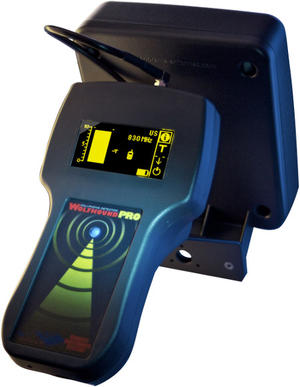Enforcing wireless-free zonesBVS combats jail cell phone smuggling
Prisons across the United States are struggling to prevent cell phones from falling into inmates’ hands; in 2010 more than 10,000 contraband cell phones were confiscated from inmates in California prisons; to help officials crack down on these contraband items, Berkeley Varitronics Systems has developed a suite of sophisticated cell phone detectors that can “sniff” out phones even when they are hidden in the most obscure places

Wolfhound Pro cellphone detector // Source: Berkeley Varitronics Systems
Prisoners and their accomplices have become increasingly adept at smuggling cell phones into prisons, but now security officials have a new tool that can help root out these prohibited items.
Prisons across the United States are struggling to prevent cell phones from falling into inmates’ hands. This trend is particularly troublesome as smuggled phones are often used to contact accomplices outside of prison to organize crimes or even to arrange murders or other illegal acts within the prison itself. According to Scott Schober, the president and CEO of Berkeley Varitronics Systems (BVS), in 2010 more than 10,000 contraband cell phones were confiscated from inmates in California prisons. As cell phones become smaller, the numbers of smuggled phones has increased and it has become even more difficult to find them using traditional methods. The problem has become so pervasive that the infamous prisoner Charles Manson has been caught using cell phones to call people across the country twice. In another high profile incident, in 2008, a death row inmate in Texas used a smuggled phone to threaten Texas State Senator John Whitmire. Officials promptly searched the facility and found 132 phones.
To help officials crack down on these contraband items, BVS has developed a suite of sophisticated cell phone detectors that can automatically alert prison guards when a phone is making calls or has entered a room.
Unlike jammers, which cost hundreds of thousands of dollars and can unintentionally disrupt communication devices outside of prisons, BVS’s Watchhound and Wolfhound Cell Phone Security Monitor systems can create wireless-free zones without interfering with other communication devices for less than $2,500.
The Watchhound system automatically monitors all incoming and outgoing cellphone calls and timestamps each record for analysis. In addition, a network of these monitors, disguised as thermostats, can be set up throughout a prison to covertly monitor for cell phones.
The company also offers portable detectors that can “sniff” out a cell phone. Using theWolfhound hand-held detector guards can actively search an area for any contraband cell phones and narrow in on the device’s location even if it is in standby mode and not actively transmitting.
“The unit has a patent pending algorithm that quickly scans the mobile phone bands and allows you to look at the strongest signal and steer toward that target (mobile phone) with the integrated direction finding antenna,” explained Schober.
“Furthermore, for each respective band there are sharp filters that keep out unwanted RF-Radio Frequency energy from other communications equipment such as correction officer’s radios or WiFi networks within the corrections facilities,” he added.
The discreet nature of the Wolfhound and the Watchhound systemsallow officers to covertly pinpoint the location of cell phones so that inmates will not have time to throw away phones or flush them down the toilet. This offersguards the opportunity to confiscate the phone and gather valuable evidence on who the inmate called, emailed, or texted.
With no sign of this trend slowing, the federal government has stepped up its enforcement efforts. In 2010, President Obama signed a law that prohibits the use of cellphones by prisoners. Those found in possession or trying to smuggle mobile phones or other wireless communication devices could face up to one year in prison.
Given the difficulty of finding and locating hidden cell phones, BVS’s technology “provides Wardens with some ‘ammunition’ to fight back against the growing problem that has no easy answer,” said Schober.
